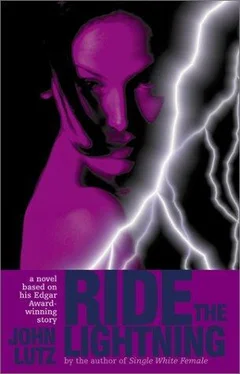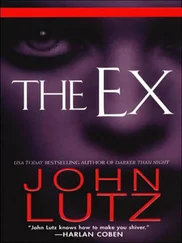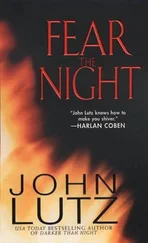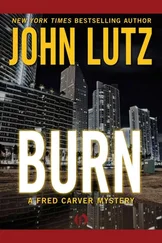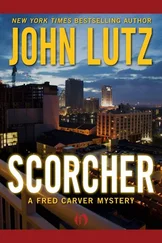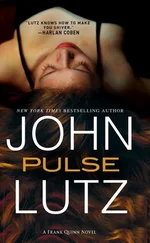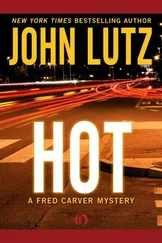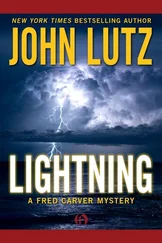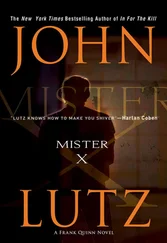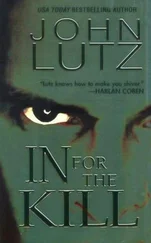John Lutz - Ride the lightning
Здесь есть возможность читать онлайн «John Lutz - Ride the lightning» весь текст электронной книги совершенно бесплатно (целиком полную версию без сокращений). В некоторых случаях можно слушать аудио, скачать через торрент в формате fb2 и присутствует краткое содержание. Жанр: Триллер, на английском языке. Описание произведения, (предисловие) а так же отзывы посетителей доступны на портале библиотеки ЛибКат.
- Название:Ride the lightning
- Автор:
- Жанр:
- Год:неизвестен
- ISBN:нет данных
- Рейтинг книги:5 / 5. Голосов: 1
-
Избранное:Добавить в избранное
- Отзывы:
-
Ваша оценка:
- 100
- 1
- 2
- 3
- 4
- 5
Ride the lightning: краткое содержание, описание и аннотация
Предлагаем к чтению аннотацию, описание, краткое содержание или предисловие (зависит от того, что написал сам автор книги «Ride the lightning»). Если вы не нашли необходимую информацию о книге — напишите в комментариях, мы постараемся отыскать её.
Ride the lightning — читать онлайн бесплатно полную книгу (весь текст) целиком
Ниже представлен текст книги, разбитый по страницам. Система сохранения места последней прочитанной страницы, позволяет с удобством читать онлайн бесплатно книгу «Ride the lightning», без необходимости каждый раз заново искать на чём Вы остановились. Поставьте закладку, и сможете в любой момент перейти на страницу, на которой закончили чтение.
Интервал:
Закладка:
Nudger wondered if that was true. He told Hammersmith not to be hard on himself and hung up.
He knew how Hammersmith would take this. He wouldn't go home and beat his wife or kick his dog or get drunk. He'd brood a while, then plunge ahead into his work, stay hard at it until time dulled memory and he reached some sort of acceptance of the past, a perspective he could live with rather than put his gun in his mouth and follow Candy Ann. Eating the gun, going out like Billy Abraham. Hammersmith wouldn't do that. He'd be all right, but it wouldn't be easy.
When word of Curtis Colt's innocence became public, Scott Scalla began to maneuver. He was no statesman, but when it came to raw politics, he could shuck and jive with the best. He was terribly upset over Colt's execution, his press secretary said, over and over. God only knew how much the governor had agonized over this. Scalla himself, interviewed after a Friends of God Christmas assembly, implied that there had been police incompetence, then a cover-up, in the Colt case. That's where the mistake had occurred, at a lower level, so that by the time the matter reached the governor's office, there was little Scalla could do but follow the letter of the law and not intercede in the execution. An innocent man was dead, and the governor of a great state had been made an unwitting accomplice, helplessly bound by law. The law had been subverted, perverted. Scalla promised an investigation. This mess in the legal process would be cleaned up.
But Scalla didn't really want an investigation. Not one that involved him. What he wanted was to leave the least damaging impression possible on voter consciousness, which he managed to do with the right succession of statements and images.
The investigation soon was shuffled from the state level down to the St. Louis Board of Police Commissioners conducting an interdepartmental investigation. Media attention had been usurped by bigger news, some of it manufactured for just that purpose, and the voting public had other things on its collective mind. And as the governor had promised, there was an investigation taking place.
All that was needed now was a scapegoat, someone to shoulder the entire burden of Colt's wrongful conviction and execution. A sacrificial name and face that would appease the public and close the case forever.
Someone expendable.
Who better than the officer who'd been in charge of the murder investigation? Homicide Lieutenant John Edward "Jack" Hammersmith.
Nudger wasn't as concerned as he might have been when he heard about the investigation of Hammersmith, and the lieutenant's suspension with pay. The Board of Commissioners knew the game; its members were under the gun themselves. And Nudger knew Hammersmith better than Scott Scalla did. "It's okay, Nudge," Hammersmith said, when Nudger dropped by to see him at his house in Webster Groves. Though the temperature was in the forties, Hammersmith was sitting in a lawn chair under a leafless hundred-year-old oak in his backyard. He was wearing paint-spattered work pants and a red-and-black mack-inaw and looked more sloppy-fat than he did in uniform. "I'm gonna be okay."
Nudger believed him. Hammersmith was, in the narrow range of his profession, as skilled and wily a politician as Scott Scalla. He could fade and feint with departmental bureaucracy, with the media, and with the Board of Police Commissioners, about whom Hammersmith knew more than they suspected.
Hammersmith got one of his horrendous cigars from his shirt pocket and lit it with a book match. "Wife won't let me smoke these in the house," he said.
"She probably doesn't want green drapes."
"By the way," Hammersmith said, "I got myself a good lawyer. Charles Siberling."
Nudger thought about Siberling fiercely chewing and spitting his way through the police-department legal process. He smiled. Hammersmith would indeed be okay. "Siberling's a good choice," he said. "You're hardly playing fair with the department."
Hammersmith beamed around his cigar, his blue eyes piercing through the putrid haze. "Boy, he's a slippery little bastard," he said in admiration. "Just like a goddamned barracuda with a brief-case. What a future he has."
"Pneumonia will be in my future," Nudger said, "if I don't get in out of this cold." The fog of his breath rose before his face.
Nudger had never seen Hammersmith do what he did then; he snubbed out a cigar half-smoked. "Come on into the house, Nudge. We'll have a few beers and bitch about the world in general."
An hour later, reassured about Hammersmith and sated by a ham sandwich and two Budweisers, Nudger returned to his apartment.
In his mail was his voter-registration confirmation, informing him of the date of the next election and the location of his polling place. The state was asking for a sales-tax increase to help fund highway maintenance. The bill's opponents claimed that the additional tax money actually would free other state money, which would be used to pay some of Scott Scalla's campaign obligations. "Money for pockets instead of potholes," their literature stated. The state-paid TV spot that was played repeatedly was a scene in which a young family's station wagon hit a pothole, flew out of control, and burst into flames. Only the father, who'd been driving, survived, though not very happily. It was a gloomy situation anyone born of woman would vote to prevent.
The bill was expected to pass by a wide margin.
Nudger tossed the registration card and campaign literature into the wastebasket and decided not to vote.
Then he walked to the living room window, stood staring out at the murky, snow-pregnant winter sky, and changed his mind. That was what people like Scott Scalla relied on, people like Nudger not voting. Nudger would vote this time, and he'd keep on voting.
Maybe someday it would make a difference.
Maybe Charles Siberling would run for governor.
XXXIV
Nudger lay with Claudia in the morning light in her bedroom. He was on his back, beneath the blanket and sheet, while she lay on top of the covers, still breathing deeply. Everything had become good between them again, Nudger thought, though not as good as it had been before their newly defined relationship. He wasn't sure if Claudia was seeing other men. He never asked, fearful of the answer.
She sighed, propped herself up on one elbow, then swiveled to sit on the edge of the mattress. Nudger watched her with the familiar awe. Her lean body was breathtaking in the soft light. Half an hour ago his groin had ached for her, and now it was his heart. A compartmentalization the women's liberation movement would frown upon with unplucked brows. Maybe they were right; sometimes Nudger felt as extinct as one of those dinosaurs with two brains, each of which provided disastrously poor judgment.
Claudia stood up and turned to look down at him. "I don't see how you can bear to stay beneath those covers," she said. "The radiator keeps it at two thousand degrees in here."
"I'm cold," he told her. "Cold's a subjective thing, even at two thousand degrees."
She shook her head, and he watched her walk away, into the bathroom. Some walk.
The shower hissed and gurgled for a while, then Claudia returned, still toweling herself dry. There were goose bumps on her arms and thighs, and her flesh was reddened where she'd rubbed too hard with the rough towel.
As she began to dress, she asked, "How's Hammersmith doing?" She'd always liked Hammersmith, and she knew how what had happened worked on him.
"Things have returned to his idea of normal," Nudger said.
"He must know some important people."
"Better yet, he knows about some important people."
The Board of Police Commissioners, after an appropriate length of time, had exonerated Hammersmith. They had become so incensed at Siberling that they suggested it was the judicial system that had been at fault in the Colt conviction and execution. Siberling blamed police procedures, politics, the sun, the moon, and the stars, everything and everyone other than Hammersmith. The buck that had stopped at Hammersmith had been broken down into small change that no one cared about.
Читать дальшеИнтервал:
Закладка:
Похожие книги на «Ride the lightning»
Представляем Вашему вниманию похожие книги на «Ride the lightning» списком для выбора. Мы отобрали схожую по названию и смыслу литературу в надежде предоставить читателям больше вариантов отыскать новые, интересные, ещё непрочитанные произведения.
Обсуждение, отзывы о книге «Ride the lightning» и просто собственные мнения читателей. Оставьте ваши комментарии, напишите, что Вы думаете о произведении, его смысле или главных героях. Укажите что конкретно понравилось, а что нет, и почему Вы так считаете.
